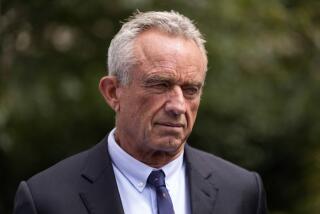In Announcing Presidential Runs, Candidates Take Many Small Steps
- Share via
WASHINGTON — In the old days, presidential candidates stood in front of a podium, told the world they wanted to be president, and then ran. Today, they like to reveal their intentions a little at a time, a sort of political striptease--first one glove comes off, then the other, then a shoulder strap dips--even though almost everybody knows how it’s going to end up.
Take former Vice President Dan Quayle, who went on CNN’s “Larry King Live” last month to make the stunning announcement that he was about to file the papers to run for president. A few days later, he called a news conference in Indiana to trumpet the formation of a committee to explore the possibility of running for president. Then he trotted off to Phoenix to tell the world he was setting up his campaign headquarters just in case he runs for president.
He repeated it all twice more for reporters in Iowa and New Hampshire. But if you missed it, don’t despair, Quayle plans to tell us sometime in April that he really, most sincerely is running for president, a fact political junkies figured out at least two years ago.
“With some candidates, the ambition is so naked to begin with that the flesh shows through any skimpy veil of hesitation they might be wearing,” said James Pinkerton, a Republican political analyst at George Washington University. “But they announce and announce and announce as long as they think they can sucker reporters into covering it.”
As in any election cycle, the competition for money is intense and, in turn, so is the race for free television, which explains in part the staggered approach so many candidates have taken to announce their intentions.
In Search of News
But what sets this campaign apart from others is a proliferation of cable talk shows that flourished during the Clinton impeachment process--all of them now clamoring for news to fill the empty hours. Campaign announcements are uncomplicated and easy to cover--they sound important whether or not they are. And as long as reporters are ready to bite, candidates will keep serving it up.
Pete Wilson, California’s former governor, perfected the model in 1995, when he spent five months announcing a candidacy that lasted just 32 days. He announced so many times and in so many settings--the Statue of Liberty, “Larry King Live,” a cross-country conference call with supporters--insiders joked that it might become necessary to put Roman numerals after each one.
“It’s a scramble for media attention,” said Republican strategist Dan Schnur, who worked on Wilson’s campaign.
With more than 10 Republicans and two Democrats poised to launch White House bids, announcements of an interest in running, establishing exploratory committees and actually taking the plunge abound.
Some candidates are better at it than others. Just this month, Texas Gov. George W. Bush announced on a Tuesday that he would have something to announce on Sunday, which turned out to be his exploratory committee. Elizabeth Hanford Dole skillfully extended the dance by announcing her exploratory committee without revealing who was on it, presumably giving herself one more crack at the pinata.
The trophy for bald ambition would have to go to GOP hopeful Lamar Alexander, the former Tennessee governor who literally has been running for president since election day 1996. Nevertheless, he has summoned the media twice since January to launch his campaign, most recently in Nashville before a stand of American flags.
Courting Boredom
On the Democratic side, the suspense-is-not-exactly-killing-us award goes to Al Gore, who is running for president without ever actually saying so, in part because he looks considerably more presidential as the incumbent vice president than he would as just another contender.
The obvious risk to all this pregame promotion is that voters will get bored with the race before the starting gun goes off, which is not until the competition heats up in the all-important Iowa caucuses and New Hampshire primary, each early next year. But campaign strategists believe average voters are not paying enough attention to be annoyed. And at the very least, voters might absorb the name of a candidate or two.
There are plenty of advantages to a long campaign windup. As long as candidates are only thinking about running, they can pull the plug on what looks to be a disastrous campaign with their dignity intact. And the longer candidates spend announcing that they are running for president, the less time they have to talk about what they would actually do if elected.
“Candidates figured out a long time ago that giving a speech on missile defense policy might get you two or three sentences in print,” said GOP media consultant Don Sipple. “But announcing your candidacy might get you on TV--even if it is for the third or fourth time.”
More to Read
Get the L.A. Times Politics newsletter
Deeply reported insights into legislation, politics and policy from Sacramento, Washington and beyond. In your inbox twice per week.
You may occasionally receive promotional content from the Los Angeles Times.










